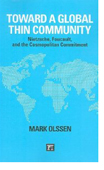Toward a Global Thin Community reexamines aspects of the liberal-communitarian debate. Although critical of both traditions, this book argues that a coherent form of communitarianism is the only plausible option for citizens today. Using the theories of Frederich Nietzsche and Michel Foucault, Olssen shows how we can overcome traditional problems with communitarianism by using an ethic of life that he identifies in the writings of Nietzsche and others to provide a normative framework for twenty-first century politics at both national and global levels. Thin communitarianism seeks to surmount traditional liberal objections associated with Hegel and Marx, and to safeguard liberty and difference by applying a robust idea of democracy. This work examines many different themes within the debate, including liberal autonomy, totalitarianism, and multiculturalism. It also considers the work of liberal writers such as Frederic Hayek, Karl Popper, and Isaiah Berlin.
Toward a Global Thin Community. Nietzsche, Foucault and the Cosmopolitan Commitment


